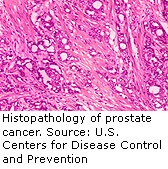
MONDAY, Dec. 7 (HealthDay News) — Diabetes, heart attacks and other cardiovascular problems appear to be more common in men with prostate cancer who are treated with androgen deprivation therapy, which reduces or eliminates the male sex hormones that can promote cancer growth, a new study has found.
The finding indicates that androgen therapy is overused because its benefits have not been shown to outweigh its dangers in many cases, said Dr. Nancy L. Keating, associate professor of medicine and public health at Harvard Medical School and lead author of a report on the study published online Dec. 7 in the Journal of the National Cancer Institute.
“There are areas where hormone deprivation therapy has been shown to have a clear benefit,” Keating said. “We’re not suggesting that men who need hormone deprivation therapy should not have it. But lots of men get the therapy where it has not been shown to have a benefit.”
One example is so-called PSA-recurrent cancer. Hormone deprivation therapy is started, Keating said, when levels of cancer-associated prostate-specific antigen (PSA) increase after surgery or radiation therapy, but there are no other indicators of danger.
“There has never been a trial showing an overall benefit in such cases,” she said. “When you can have potentially serious adverse effects, you want to show caution.”
Similarly, Keating said, no trial has shown an overall benefit for androgen deprivation therapy in cases where “watchful waiting” is chosen rather than radiation therapy or surgery for prostate cancer, Keating said.
“One third of men over 65 who don’t have surgery or radiation get this therapy,” she said. “Yet its effects have never been studied in a controlled trial.”
Previous studies have shown potential dangers related to androgen deprivation therapy in older men, Keating said. The study she led looked at its effects on about 37,000 men treated for prostate cancer at Veterans Affairs hospitals.
Surgical removal of the testes was associated with a 40 percent increased risk for heart disease and a more than doubled risk for heart attack. Use of multiple hormone-blocking agents was associated with a 27 percent increased risk for heart disease.
The greatest risk was found for drugs that target gonadotropin-releasing hormone: 159.4 cases of diabetes per 1,000 person-years, compared with 87.5 for men who did not have androgen deprivation therapy, as well as a 35 percent increased risk for sudden cardiac death, a comparable increase in heart attack risk and a 22 percent increased risk for stroke.
Observational studies, which include all people with a condition, can never conclusively prove cause and effect, Keating acknowledged, because “the thing we can’t account for is whether people who are on a treatment are different from those who aren’t.” But detailed evidence about the potential dangers of androgen deprivation therapy has not emerged from the more rigorous controlled trials that have been done “because they have looked only at cardiovascular deaths, and most patients who have heart attacks do not die of those heart attacks,” she said.
Dr. Peter Albertsen, a professor and chief of urology at the University of Connecticut Health Center, said that “the point of this paper is to help physicians understand that long-term use of this therapy carries consequences.” Albertsen wrote an accompanying editorial in the journal.
Anti-hormone therapy was developed to treat the pain and other problems of advanced prostate cancer, Albertsen said, and so it was generally used for only three to five years.
“Now, many more men are being started on androgen deprivation therapy long before there are any symptoms of prostate cancer so they may be on it for up to 15 years,” he said. “We are beginning to realize that there can be significant problems in terms of cardiovascular risk. So the lesson is that if you start the therapy early, you should be sure that there is increased survival because there is a downside.”
Dr. Eric A. Klein, chairman of the Cleveland Clinic Glickman Urological and Kidney Institute, said that the study “is confirmatory of a lot of other, smaller studies.
“There is a growing realization that we cannot use androgen deprivation therapy in a haphazard fashion,” Klein said. “It does save lives or delay progression for men with metastatic prostate cancer so the trade-offs there are reasonable. But in many other cases, the downside probably exceeds the benefit.”
More information
The U.S. National Cancer Institute has more on prostate cancer.

